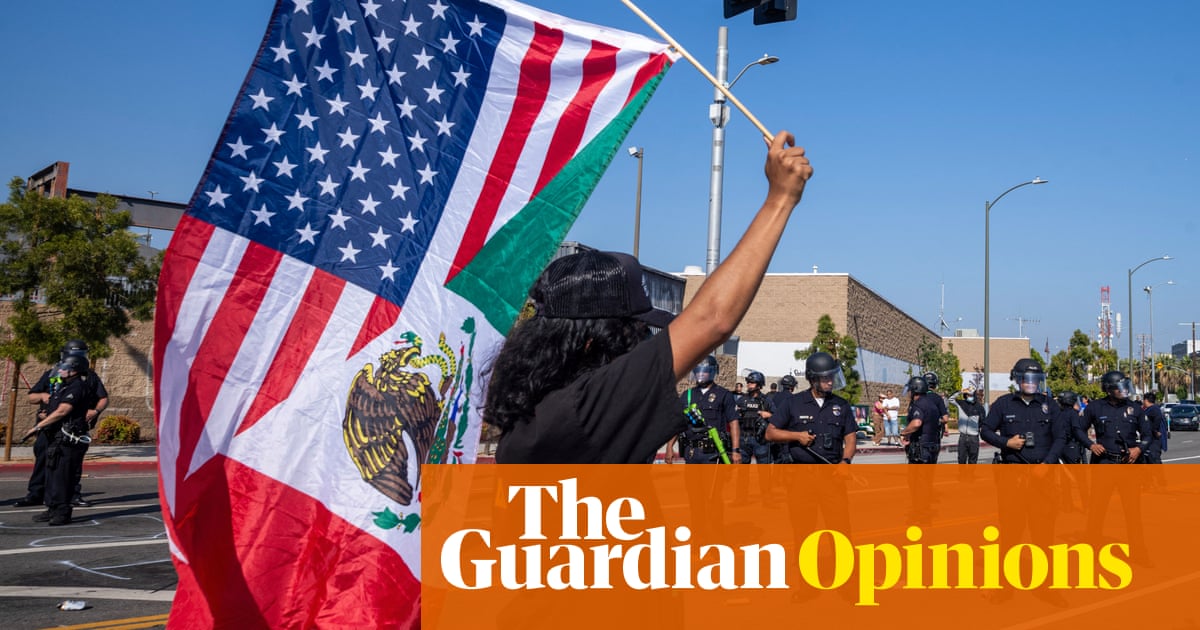In Los Angeles, it’s not uncommon to hear the buzzing of a police helicopter overhead. The sound is almost background noise in this city. A reminder that somewhere, something is happening, something you aren’t a part of. It’sout there, but it’s notright here. But more and more, that sound has begun to jolt us out of our complacency. In the last five years, that sound has heralded the uprising over the killing of George Floyd and the devastation of the Eaton and Palisades fires. Instead of the usual – a high-speed police chase, a burglary or some other fodder for local news sensationalism – that sound means you are living on the doorstep of history once again. This last weekend reminds us that our city is under siege from a federal government eager for a fight. That our immigrant neighbors are being disappeared, apparentlywithoutdue process.
I’ve gotten texts from family and friends asking if I’m OK as this all transpires. Most people outside LA don’t realize just how big this place is. That in these moments, it can feel like the events are happening in another world. You might see someone pouring a water bottle over their head on the sidewalk, trying their best to mitigate the damage caused by teargas. Google Maps shows you the 101 freeway is closed – a bright red line through your morning commute. Co-workers offer uneasy glances. After all, you have to go to work. You have to keep going. You can’t stop for one second to truly reflect on what you’re witnessing, or you might get washed away by the crushing demands of even the simplest life.
During this year’s fires, I had to move houses. The movers came and dutifully trudged up and down stairs, lifted boxes and drove back out into the red horizon. Some restaurants remained open, serving food despite the toxic air and general sense of dread that consumed the region. Many of those people, who did all they could to earn a living so we could approximate normalcy, were immigrants from countries like Mexico, El Salvador, Venezuela and anywhere in between. They were also the ones who kept restaurants open during Covid lockdowns or drove for Uber Eats, again, so I could feel normal in abnormal times.
And they’re doing it again, but the danger is even more immediate. People are being taken from their jobs, their homes, their schools – without warning and without their rights. For a lot of us in LA, it can feel like it’s happening somewhere else. Downtown, the suburbs – but itishappening here. Within the arbitrary geographical lines that form the city of LA and the surrounding county. Those lines, like the ones that we created to divide us into nation-states, do matter, even if they aren’t natural. They matter because they are how we identify, how we form communities. The world is not borderless, even though some of us might wish it to be. They exist, for better or worse.
Right now, it does feel like it’s for the worse. Donald Trump and his administration see those lines and they weaponize them; they use them to create fear and chaos in our cities. They grab human beings and toss them over those arbitrary lines, denying them their dignity – the dignity that is enshrined in our constitution for all peoples. In a moment like this, it’s easy to curse the very notion of those arbitrary lines, as they cause so much misery. But those lines also create commonality. More than ever, those of us in LA should look at who and what is within our city limits. Not because we should fear what’s outside, but because we should care about what’s inside. We should always care, no matter where cruelty takes place, but even more so when the cruelty happens to those who share our home.
LA might be the greatest empathy test humanity ever devised. A nearly 500-square-mile city, with close to 4 million residents spread out all the way to the ocean. To live in LA is to have the opportunity to live a fully internal life. I never saw the fires. I barely saw the smoke. The devastation was relegated to my TV screen, my smartphone. It’s a city built on privacy, isolation and riddled with neighborhoods surrounded by gates and private security. Mike Davis’s seminal history of LA urbanism,City of Quartz, built its narrative around the idea of LA as a panopticon fueled by greed, riddled with paranoia and beholden to the prison-industrial complex. It made such a mark on our city’s culture because it’s often true. This can be a dark, lonely place. But it can be a haven, too, if you look up from the ground, peer out from behind your own anxiety and believe in the idea that there is more out there than what is happening directly in front of you.
This is a moment where we have the power to decide what kind of city we want to live in. We can cede our agency, our will and our community to brute force or we can live together. We can pass the empathy test and make it clear to the world that LA is not a bastion of unchecked individualism, but a city of communal spirit and diversity. I don’t know what the solution to this crisis is. Governor Newsom is suing to repel the national guard order, but it will take time, and the president hasnot shown much interest in abiding by court rulings. All I know is that this will not end unless the city and its population stands firm on its values and morals. That it stands together even if it’s so easy to see what’s happening as just another reason for bad traffic.
Dave Schilling is a Los Angeles-based writer and humorist
